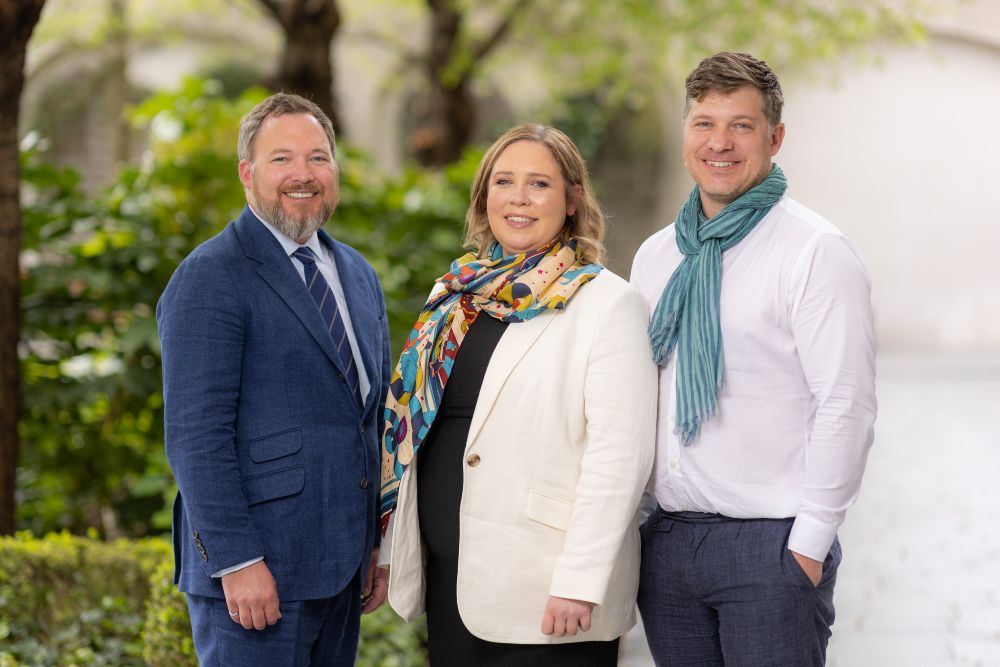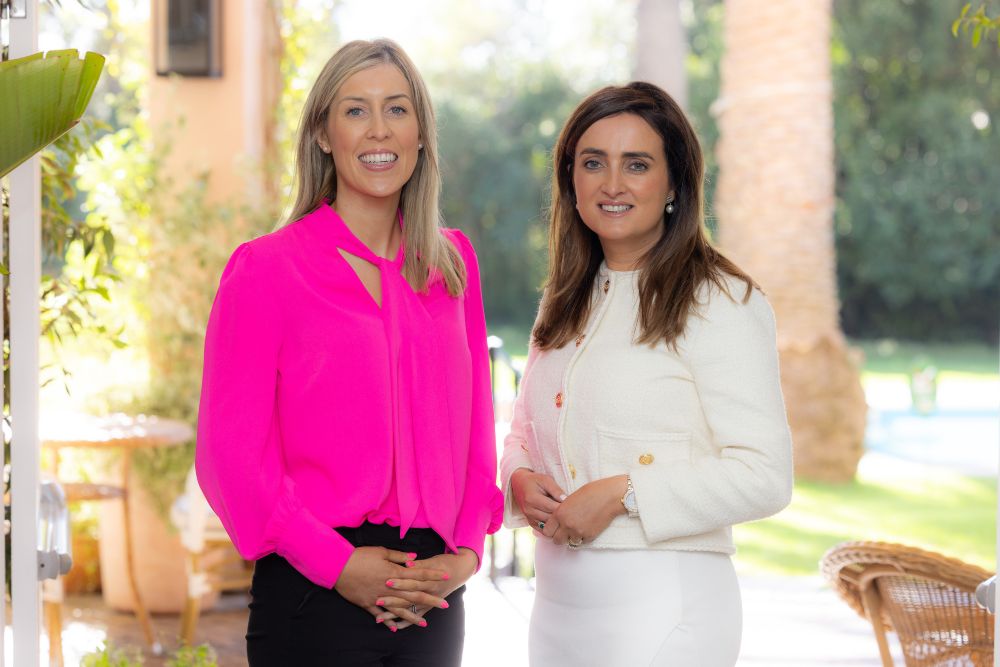Podcast Ep 272: Gary Lavin on Building VitHit, from start-up struggles and insolvency to producing 45m bottles this year for 18 global markets.
The road to success is never straight and nor is it always swift. For vitamin drink brand VitHit’s founder Gary Lavin it has been a 25-year odyssey that has included insolvency and redundancies, but ultimately redemption and recognition.
The EY Entrepreneur of the Year finalist for 2025 spoke with ThinkBusiness about his journey and various mistakes including market timing, branding but also why staying privately-owned was key to success.
“I got to a stage where I was failing so much that it was almost like a challenge. How much could I take without falling over? And again, that’s a kind of competitive spirit”
Today the former rugby player’s business is selling 45m bottles of the popular health drink blended with real juice that keeps sugar intake low. It employs 30 people and sells the product in 18 markets worldwide, growing at a trajectory of 18% a year.
“I think the first 10 years, I was making a lot of mistakes, and I was doing it my own way, which I found wasn’t the correct way. If people live in Ireland now, they see VitHit everywhere – we’re in every store across the country – but they might have only started seeing it maybe eight to 10 years ago, and they’d probably think it’s a relatively new brand. But we had a lot of different iterations. The brand was called something different back when I started in 2000, so there were a lot of mistakes. That’s what happens when you do things yourself. Had I built it up through a big distributor like Coke or Britvic or something like that, it would have gone up a lot quicker. It takes 25 years to become an overnight success, I suppose.”
An overnight success 25 years in the making
-
You can also listen to the Podcast on:
-
Spotify
-
SoundCloud
-
Apple
“If you take a sports person plus an entrepreneur, and you put them together, the entrepreneur wants to be in something healthy. I could see all the things that people were drinking were really unhealthy”
He admits that despite it being a long road, it has been an interesting journey. “I wouldn’t change anything because it has us in a great position now. I could have gone the venture capital route, but I just wasn’t aware of it back in 2000. But back then, I probably would have given away the whole company and I probably wouldn’t have it now. We’re 100% privately owned. We’re the only company I know of between Ireland and the UK that have the sales we have, that are completely privately held. So that’s a really positive thing.
“It was tough – you have to keep your eye on the dollars, and cash flow is highly important. Because you can’t go for, if you’ve no funding, you can’t dip into any pot. It’s literally you have to be a profitable company. And we weren’t profitable for years. I was funding it through money back in the Celtic Tiger – I was buying and selling the odd apartment, and that dried up pretty fast in 2007. So we just had to get real and make profits. We’ve been profitable probably since 2009.”
Lavin believes VitHit was the first of its kind in Europe, but saw rivals in the US being acquired by giants like Coca Cola for billions, which galvanised his ambition.
“When I was young and in school, I had loads of business books, and I wanted to get into my own business. I never wanted to work for anybody. I tried lots of different things. If you take it back to around 1994, I was playing a lot of rugby, and I got injured in ‘96. From there was kind of a lot of germination of ideas. If you take a sports person plus an entrepreneur, and you put them together, the entrepreneur wants to be in something healthy. I could see all the things that people were drinking were really unhealthy. All the top sports people were still drinking energy drinks that had a lot of sugar in them. I was looking around thinking there has to be a better way. Because I didn’t want to drink those sugary drinks, and with my sports knowledge I knew that sugar was bad, and the public didn’t really know that yet. So that was probably the germination of the idea.”
Humility and passion
Seeing rivals bought for billions and having his own brush with insolvency taught Lavin humility and in a sense he believes had success come earlier he mightn’t have been ready for it.
“I think you need to have – certainly I needed to have – a series of failures to realide what success looks like. Had the company been successful to start, I probably would have burnt it out. I don’t know what I would have done with it, because I was a young lad running around Dublin, playing a bit of rugby, thought I could take on the world. I thought that nothing could beat me and would make bad financial decisions. I certainly did years ago, but I didn’t have any money to set on fire. It’s different now – I’m married with two kids, things change. But when you’re young, the positive side is that you take lots of risks. I think everybody who’s young should take risks, because I didn’t have any dependents, I didn’t have any kids, I didn’t have a home when I started it. There was a lack of fear because I was young, and I was failing all the time in the first 10 to 12 years. But it didn’t matter so much that I was staying awake at night because I couldn’t feed my family.”
An insolvency in 2007 would be enough to break the stoutest heart but Lavin kept going. His resilience comes from not fearing criticism.
“I actually still don’t care what people think. I remember when that happened – I was at a rugby game a year later, and I overheard someone saying ‘there’s Gary Lavin, you know, he was insolvent, a lot of trouble business-wise,’ and I was just looking, going, ‘I’m going to show you.’ I think it’s probably a competitive spirit that came from playing lots of sports. Even to this day, if a retailer doesn’t take us on, I’m always like, ‘I’m going to show you.’
“I still have a really deep-seated competitive spirit. I got to a stage where I was failing so much, and sports gave me resilience to fail – you lose games and whatever. But I got to a stage where I was failing so much that it was almost like a challenge. How much could I take without falling over? And again, that’s a kind of competitive spirit. I think people care too much about what people think. People are online, living fake lives, pretending to drive yachts, and everyone pulls into it and believes it. I always say to young people ‘take your own route. Eventually, if you’re staying in the same industry and work hard enough at it, you’ll get to the top of your industry.’ I think it’s really dangerous comparing yourself to other people. I think that leads to mental issues.
Make the world your oyster
His advice to young Irish people is see the world. “Get on a plane and leave. You’ll always come back. I’m not saying to leave forever. Irish people will always come back. Even when I was young, everyone was getting on planes, going to Australia, going to America, working in industries, and then coming back. All my friends have gone away for 10, 15 and 20 years, and they’ve all come back. When people say, ‘I can’t buy a house in Ireland’ and ‘I can’t do this in Ireland’ – yes, it is very unfortunate. I couldn’t afford a house in Ireland either. I went to the UK, and I bought a house in the UK back in the mid-90s. So that would be my first bit of advice – get some experience abroad. If you’re young and you want to build for a house, and if the opportunities are not there in Ireland, there might be opportunities in other countries. I wouldn’t just say, ‘Oops, it’s over,’ because I have no opportunity in Ireland. The world’s a big place – you can go anywhere, especially with a degree.”
His second bit of advice for entrepreneurs is just take one step every day towards whatever your dream is.
“Had someone said it’s going to cost €300k to start a business back in 2000, I would have said, ‘Well, I can’t do it.’ I naively thought it was going to cost €30k or €40k. I saved for that, got my first pallets, got my first products created, and took one step. Then I’d fail, then I’d get another step, then I’d fail again. Don’t look at the final destination – that is your prize, that’s your Everest. I’m still at my final destination, and I started 25 years ago. Keep it there as a pin on the wall and say, ‘Okay, all the little steps I can take towards that final destination.’ Don’t be looking at going, ‘I’m never going to create a drinks company that’s selling 45 million bottles.’ You could say, ‘Wouldn’t it be great if I sold 10,000 bottles?’ Little increments and then build from that.”
So when did it go right for Gary? “I think two things – the market had caught up with us, but we were kind of indebted at the time when the market had caught up, so we couldn’t really expand at that stage. Basically, I had a meeting with a guy who worked for Monster, and he turned to me and said, ‘God, it’s a pity what’s happened to your brand.’ I said, ‘What do you mean? Our sales are 40% up on last year.’ He goes, ‘Yeah, but you’re in 30% less stores.’ I was like, ‘What?’
“So obviously my distributor was failing, and my product was doing well, selling really well. That was a real surprise to me. So then I moved to another distributor, and our sales went from 3,000 cases a month to 30,000 cases a month in one month. We 10x-ed just in one month. So we were actually succeeding, but I didn’t know it. We were on a really small level, and our sales were climbing in store. People really wanted the product, but we were in less stores because the distributor was failing. We got rid of that distributor, moved on to a great distributor, and the product just took off.”
And now the world is becoming his oyster. “It’s good on average. Some countries, we’re doing really well. I’m living in the UAE, and that actually has not been good for the past three years because we had distribution problems. We’ve just fixed that now, and it’s really starting to take off. The UK is a really, really strong market for us. Ireland has always been our number one – we’re the seventh best-selling drink in the country, so we outsell Diet Coke and Innocent smoothies. It’s a real success in Ireland.
“But unfortunately, if you are successful in Ireland, because we’re such a small country, it’s still not a worldwide success. So you have to go to the big brothers of America or UK or France. We went to the UK back in 2013 and that’s been very successful. We’re the market leader in health drinks over there. That’s growing 30% to 35% a year at the moment. Belgium and Holland are very strong for us, and we just started in Spain. So Europe and UK-based is our stronghold. We are in Australia and UAE and stuff like that, but I’d say stronghold is around Europe.”
How to bottle ambition
Branding is integral to the VitHit turnaround. “When I was failing years ago, the brand was called ‘Vitz’ and it was probably 2006-2007, sales weren’t going off the shelves at all. I brought it to some DIT students because I couldn’t afford a marketing research company. I was sitting at the back of the class listening to them and they said, ‘Oh, Vitz must be a German product.’ I thought it meant vitamins, but the consumer thought it was German. I was like, ‘Right, I need to come up with a new brand name.’ So I scrapped it, thought of VitHit, and registered VitHit. From that point, sales went up 100% just with the brand name change. Small brands like us don’t have massive budgets to be able to tell people what things mean – you just have to literally say what it is on the bottle. That was a huge lesson for us.”
The value of becoming an EY Entrepreneur of the Year finalist has been the alumni network that Lavin has discovered.
“I don’t mix too much with people from other industries – as in other entrepreneurs. My friends are still the friends I’ve had since I started in school. It’s not that I’m not sociable, it’s just these are the pals I’ve had from Ireland. I was never much of a networker. I don’t go to things to network and gain business knowledge. I’m on my own track in the vitamin drinks business. So I didn’t know what to expect, but I was genuinely, really pleasantly surprised.
“Everybody is so open, they’re so friendly. Everybody wants each other to succeed. We went to Japan, met a lot of great people. We were all out during the days and the evenings, talking about very similar issues that we’re all going through. The support was unbelievable. There’s the newbies who are awesome, and there’s alumni who go every year. I’m looking forward to being alumni next year – I think I’m in there for life now. I’m never leaving. I really enjoyed it. You’re sitting on a bus going to the next gig with someone who’s been doing it longer than I have. Here I am thinking, ‘Well, I’m doing great, doing 45m bottles,’ and there’s somebody sitting on a bus one day doing probably 100 times the turnover we were doing. And I never even heard of this business. I was like, ‘Wow, this is incredible.’ That kind of thing is just invaluable.”
-
Bank of Ireland is welcoming new customers every day – funding investments, working capital and expansions across multiple sectors. To learn more, click here
-
For support in challenging times, click here
-
Listen to the ThinkBusiness Podcast for business insights and inspiration. All episodes are here. You can also listen to the Podcast on:
-
Spotify
-
SoundCloud
-
Apple





